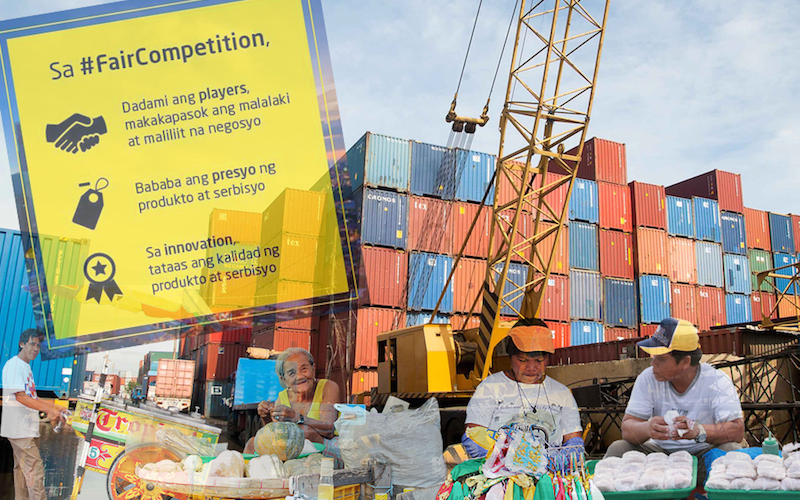Bam on Price Fixing and Cartels (‘Umagang Kay Ganda’ Interview)
Q: Pag pinag-uusapan ang Fair Competition, ang isip ng tao, blue market economy. Pang-karaniwang tao ito?
Sen. Bam: Well actually, ang Philippine Competition Act, pasado na ito. Hinihintay na lang iyong pirma ni Presidente. This is actually a landmark bill. Ito ang isa sa pinaka-landmark bill ng 16thCongress.
Sabi nga nila, longest-running bill in Congress. Almost 25 years na itong nakabimbim sa Kongreso. Sabi nga ng maraming eksperto, dapat after World War II pa ito naipasa. Because of vested interest, hindi ito mapasa-pasa.
Finally, napasa natin ito. So we’re very proud of this bill. We’re hoping mapirmahan na ito ng Presidente. Ang lalabanan ito, mga kartel, mga abuses of dominant players. Pabor talaga ito sa ating taumbayan, especially iyong mga namimili.
Q: Ano ang pakinabang ng mga sasakay sa tricycle ngayon, pupunta sa palengke diyan sa panukalang iyan?
Sen. Bam: Unang-una alam naman natin na may nagmamanipula ng presyo ng bilihin. Of course ang pinakasikat diyan ang garlic at onion.
Mga iba’t ibang mga negosyante, mag-uusap-usap, o hindi muna tayo maglalabas ng mga produkto, pataasin natin. Pagtaas ng presyo, babanatan natin iyong merkado. That’s called price fixing.
Sa ating bansa, hindi malinaw ang batas na nilalabag nila. With this law, pag napasa na ito, malinaw na malinaw puwede mo silang kasuhan ng price fixing among competitors.
Iyong isa pa riyan, iyong tinatawag na abuses of dominant position. Iyong malalaking kumpanya hindi pinapayagan ang mga maliliit na pumasok sa merkado. Kanya-kanyang girian iyan, kanya-kanyang box out iyan.
Kaya for certain industries, kakaunti ang players diyan, kakaunti lang ang mga kumpanya. Alam natin na kapag kakaunti lang ang kumpanya, mataas ang presyo, hindi maganda ang kalidad. That’s also now prohibited.
Q: Kung ano lang ang ibigay ng negosyante, iyon lang ang tatanggapin…
Sen. Bam: Iyon ang monopolyo, wala kang choice. But if itong malalaking players naman, kung lahat sila, patas-patas ang laban, level playing field, whether malaki ka o maliit ka, puwede kang makipagsabayan sa merkado, pabor iyon sa mga tao.
Ang third, iyong tinatawag na mergers and acquisitions. Kapag may malalaking kumpanya, nagsasanib sila, the Philippine Competition Commission, na binubuo ng Philippine Competition Act, puwede silang magsabi na hindi puwedeng magsama ang mga kumpanyang iyan.
Kapag nagsama iyan, masyadong mako-concentrate ang kapangyarihan sa merkadong iyan. You cannot merge. So very powerful ang mabubuong opisina ng Philippine Competition Act, ang Philippine Competition Commission.
Sa ibang bansa, normal iyan e. Kumbaga competition policy is already normal in all the rest of the world. Tayo po, huling-huli tayo dito. Finally, kapag naipasa po ito, masasabi nating nakikipagsabayan na tayo sa buong mundo.
Q: Dito po sa Southeast Asia, pang-ilan tayo doon sa nagkaroon ng competition policy.
Sen. Bam: If I’m not mistaken, tayo ang isa sa pinakahuli. Iyong last na nagkaroon ng competition policy was Malaysia in 2012. But if you look at Europe and the US, 20s, 30s, 40s, 1940s pa iyong kanilang competition policy. Iyong Japan actually had their competition policy after World War II.
So talagang panahon na magkaroon na ng polisiyang ito. Malabanan natin ang kartel, malabanan natin ang abuses ng mga monopolyo at masiguro nating fair ang merkado sa ating namimili.
Q: Ilang araw na lang ang hinihintay natin bago ito pirmahan ng Pangulo?
Sen. Bam: I’m hoping mapirmahan ito bago ang SONA. Because I think maganda itong i-announce during the State of the Nation. Nakakatawa nga e, itong bill na ito ang pinaka-importanteng bill na hindi alam ng mga tao.
Hindi po talaga siya napag-uusapan but we worked very hard for this bill. Iyong bicam po nito, apat na araw, over 30 hours ng deliberations. Napakatagal po at napakahirap buuin, but we feel once this bill is passed, pabor po ito sa maliliit na negosyante at pabor sa ating namimili.
Q: Malapit sa sikmura. Maraming salamat Senador Bam Aquino.

Recent Comments